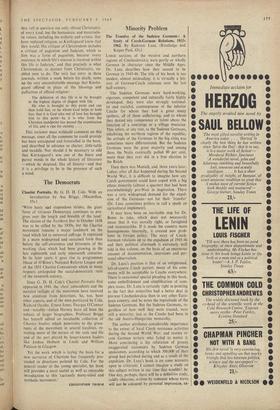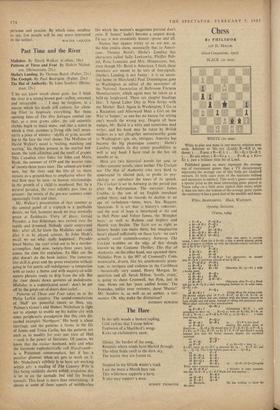Minority Problem
LARGE sections of the western and northern regions of Czechoslovakia were partly or wholly German in character since the Middle Ages. Dr. Luza describes how they ceased to be German in 1945-46. The title of his book is too modest, almost misleading; it is virtually a his- tory of German-Czech relations over the last half-century.
The Sudeten Germans were hard-working, vigorous, competent and culturally fairly highly developed; they were also strongly national- ist and racialist, contemptuous of the inferior Czechs for whom they had a great many epithets, all of them unflattering, and to whom they denied any competence or talent above the function of a concierge or a village musician. This refers, at any rate, to the Sudeten Germans, inhabiting the northern regions of the republic; the attitude of the Germans in the big cities. was sometimes more differentiated. But the Sudeten Germans were the great majority and among them the Nazis eventually polled 80 per cent, more than they ever did in a free election in the Reich.
Then there was Munich, and, three years later, Lidice; after all that happened during the Second World War, it is difficult to imagine how any Czech government could have coped with a big ethnic minority (almost a quarter) that had been overwhelmingly pro-Nazi in inspiration. There was a very widespread demand for the expul- sion of the Germans—not for their `transfer' (Dr. Luza sometimes prefers to call a spade an agricultural implement).
It may have been an inevitable step for Dr. Benes to take, which does not necessarily mean that it was morally right, or farsighted and statesmanlike. If-it made the country more homogeneous internally, it created new prob- lems in foreign policy. The story of Czech- German relations up to the expulsion of 1945.46 and their political aftermath is extremely well told in this volume, on the basis of an enormous amount of documentation, interviews and per- sonal observation.
Dr. Luza's position is that of an enlightened, left-of-centre Czech patriot; many of his com- ments will be acceptable to Czechs everywhere. There is occasional special pleading in this book, some embellishment and simplification of com- plex issues. Dr. Luza is certainly right in pointing to the fact that minorities had a better deal in pre-war Czechoslovakia than in any other Euro- pean country, and he notes the ingratitude of the Sudeten Germans. But the Sudeten Germans, re- gardless of how well they were treated, were still a minority, just as the Czechs had been in the old Austro-Hungarian monarchy.
The author attributes considerable importance to the extent of local Czech resistance activities during the Second World War; and resents re- cent German writers who failed to notice it. More convincing is his refutation of grossly exaggerated statements by Sudeten German spokesmen, according to which 300,0(X) of their group had perished during and as a result of the expulsion. Dr. Luza's book is on some accounts open to criticism; I cannot imagine a study on this subject written in our time that wouldn't be.
One day, perhaps, there will be a definitive study, coldly objective, written by someone whose views will not be coloured by personal impression, ex- perience and passion. By which time, needless to say, few people will be any more interested



































 Previous page
Previous page